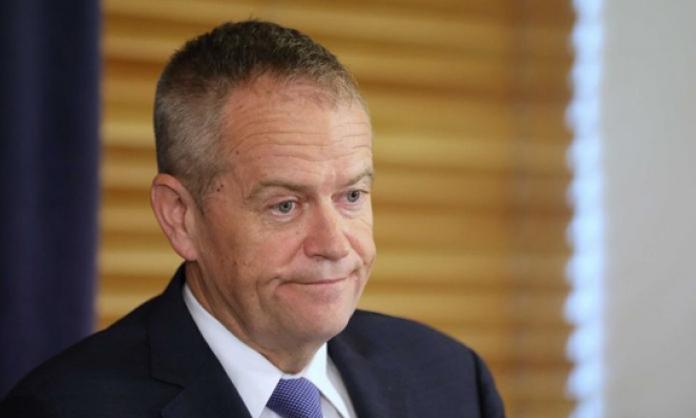Bill Shorten’s announcement that a Labor government would repeal tax cuts to businesses with a turnover of between $10 million and $50 million unleashed a media and business offensive against the ALP leader.
The Master Builders Association and the Council of Small Business Associations, usually fierce opponents of collective action by workers, both announced that they would mobilise their tens of thousands of members in hard-hitting campaigns against Labor’s “tax hike”.
The Coalition said that it was just another example of Shorten’s “class war” agenda. The media agreed, declaring that it had been a “blunder” and regurgitating the Coalition’s talking point that the decision was a “$20 billion tax hike”.
The Sydney Morning Herald and Age newspapers extensively covered affected businesses. The Herald gave an underwear manufacturer, Sean Ashby, owner of aussieBum, front page treatment as he sooked that there was “no motivation to grow your business if all you are doing is paying more tax”.
The question of how he had survived the rigours of the existing tax regime, which had allowed him to build his business from a one-man operation to “a thriving empire”, was left unasked by the journalist writing the story.
Let’s put Shorten’s proposal into perspective. His policy was to repeal a tax cut that would benefit 20,000 business owners. That’s just half of 1 percent of the total number of businesses in Australia. Labor was going to leave untouched the tax cut already enjoyed by 3.3 million businesses, 99.2 percent of the total. Hardly “class war”.
The 20,000 companies affected were not “mum and dad businesses”, as the media kept describing them. They employ on average 75 workers, with annual profits of around $1.5 to $2 million. These companies were simply defending their privileged treatment at the hands of the tax man.
Most employees, those on taxable incomes of between $37,000 and $90,000, pay a marginal rate of 32.5 percent. Here were these bosses, with turnover of tens of millions of dollars, screaming at the prospect of paying 30 percent under a Labor government, rather than 27.5 percent and, within a few years, just 25 percent, under the Coalition.
Assuming each one of these 20,000 companies earns a profit of 10 percent on turnover, the Coalition’s tax cut will give the smallest one of them $25,000, right up to $125,000 for those with turnover of $50 million. This is on top of all the other benefits enjoyed by business – the tax write-offs on investments, the personal expenses put down as business costs.
This is all money coming from the public purse. If there’s a class war going on, it’s being waged by business, not by Shorten.
If you listen to the bosses and their representatives, however, their fury at Shorten’s proposal had nothing to do with fattening their own bank accounts. They claimed to be worried about their ability to give back to the workforce and community.
“Where it is going to hit is wages. You can kiss your bonuses goodbye”, aussieBum owner Ashby told the press. The Master Builders Association declared that Shorten’s decision jeopardised builders’ enthusiasm to “contribute to greater employment”, while the head of the industry group representing 5,000 petrol stations said that repealing the tax cuts “cruels investment decisions right now”.
But medium-sized businesses are not the community heroes that they and their defenders make out. They are some of the worst offenders with wage theft and ripping workers off. As any union organiser can attest, they are the most vicious when it comes to victimising workers who stand up for their rights. Any idea that the tax cuts to these businesses would just “trickle down” in more jobs and higher wages is a joke.
But it wasn’t just the usual suspects – the media and government – campaigning against Shorten’s modest proposal to claw back tax concessions to the Coalition’s small business base. With speculation about the potential for a change of Labor leadership within the next couple of months, members of the Labor federal caucus more or less openly briefed the press to make clear their opposition.
Backflip Bill
Just days after announcing Labor’s intention to roll back the tax cuts, Shorten capitulated. That he caved under pressure so quickly is evidence that the ALP is all too ready to crumble when faced with media and business attacks.
The Coalition relished the moment, Turnbull describing the backdown as “completely and utterly humiliating” and claiming that Shorten has “no authority within his own party”. The Brisbane Courier Mail described it as “humiliating”. The Age and Sydney’s Daily Telegraph both argued that the whole affair proved Anthony Albanese’s case that the party has to work more closely with business to avoid any future “mistakes”.
The outcome is a defeat for Labor’s attempt to position itself as willing to rewrite the rules so that workers and the poor are not taken advantage of by business. It will only encourage the right wing and Shorten’s opponents within the ALP to go harder against progressive economic measures and his attacks on “trickle-down economics”.
And it confirms Labor’s reluctance to pursue progressive reforms when the going gets tough. All this while Labor is still in opposition – something that shows what Labor will do in government if it wins the next election.









